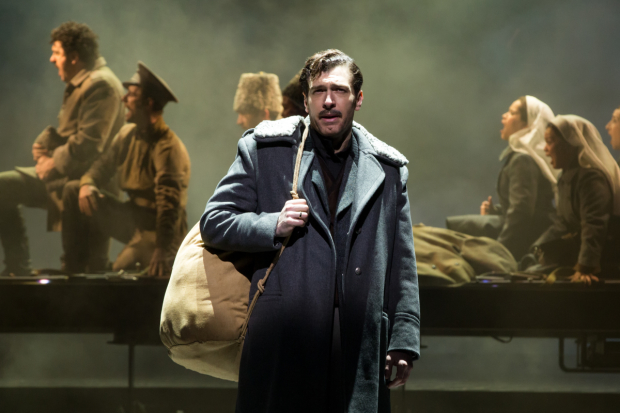Doctor Zhivago
Boris Pasternak’s epic novel set during the Russian Revolution becomes an even more gigantic musical.

(© Matthew Murphy)
Doctor Zhivago is based on Nobel Prize winner Boris Paternak's best-known novel, which became an Academy Award-winning film starring Omar Sharif. The show, much like the movie, attempts to cram 700 pages and the entire Russian Revolution into 2 hours and 45 minutes (though it's 30 minutes shorter than the movie), frequently stopping for composer Lucy Simon's made-for-radio power ballads. The result is about as messy and reductive as it sounds.
Zhivago starts auspiciously enough, with "Two Worlds," a musical montage that plows through several chapters in a matter of minutes. We get an immediate sense of the setting, characters, and obstacles in Pasternak's story. We see our protagonist, Yurii Zhivago, as a boy (Jonah Halperin) attending his mother's funeral. By the time the song has finished, he's grown into a successful doctor and poet (Tam Mutu), and married Tonia Gromeko (Lora Lee Gayer), the daughter of a wealthy Moscow family. Meanwhile, dressmaker Lara Guishar (Kelli Barrett) carries on simultaneous affairs with bourgeois schemer Victor Komarovsky (Tom Hewitt) and idealistic young communist Pasha Antipov (Paul Alexander Nolan). Pasha leads a demonstration in the streets, which ends in a bloody crackdown by the Tsar's forces — all of this happens in the first number!
In truth, Doctor Zhivago would have to maintain this feverish pace in order to hit all the plot points in Pasternak's meandering novel, which takes us through World War I and the rise of Stalin. Book writer Michael Weller has engaged in extreme editing to allow at least one story line room to breathe. His focus is on the relationship between Zhivago and Lara, a love story that sucks the oxygen away from every other character, leaving hyperventilating sketches in its wake.
Despite a sympathetic performance by Nolan, we never really get a sense of how bright-eyed young revolutionary Pasha transforms into the ruthless Strelnikov, a Red Army commander with a take-no-prisoners attitude. Strelnikov is perhaps the most symbolically important of Pasternak's characters: a dreamer jaded by violence. In many ways, his story mirrors that of the Soviet Union. In this show he is always a shouting fanatic and it is difficult for us to understand his initial appeal to Lara.
Similarly, the Tonia-Zhivago romance never comes alive. In the film, Zhivago's wife is a saint, making us extremely ambivalent about his love for Lara. In the musical, Tonia is invisible when not lambasting her husband. "Don't argue. Tomorrow, you'll leave for town first thing in the morning," she yells at Zhivago, practically pushing him into the arms of Lara (who lives in Yuriatin, the fictional Ural Mountain town she urges her husband to visit). We completely understand Zhivago's cheating heart.
Composer Simon (with help from Michael Korie and Amy Powers' banal lyrics) kills any remaining qualms with her second-act duet "It Comes as No Surprise," which Tonia and Lara sing together:
I feel him closer…
When she is near.
I feel him closer…
When she is near.
They repeat it like a mantra for sister-wives. It's just one of many soaring but repetitive ballads in this score that allows the talented cast to show off its vocal chops while gently lulling us into a stupor.
Director Des McAnuff strategically places loud gunshots and explosions throughout to wake us up. He also makes us wince during the war scenes with a cinematic level of realistic blood and gore (special effects by Greg Meeh). Choreographer Kelly Devine gives us a first-act showstopper with her high-flying Hopak in "It's a Godsend." Our ears perk up for "Somewhere My Love" ("Lara's Theme" from the movie), but it does little to illuminate the moment in the story (the point at which the Russian army is leaving the Eastern front) before it vanishes completely, never to be heard again. While there are a lot of great elements in Doctor Zhivago, none of them seem to work in tandem.
Sean Nieuwenhuis' hyperactive video design adds to the show's camp value, especially when Lara's giant head appears on the upstage wall behind Zhivago during one of his many forgettable songs.
Responding to the Shakespearean scope of the story, Michael Scott-Mitchell has designed a useful set of four sliding wings on either side of the stage, each buttressed by a Corinthian column. This allows McAnuff to create a startling number of playing spaces. Inexplicably, this set is replaced by four immovable arches of crumbling brick in the second act. Perhaps this is to signify the rigidity (and ugly aesthetics) of the Soviet system. If so, it is a terribly expensive metaphor, requiring McAnuff to incorporate the bricks into every second-act scene.
At least Paul Tazewell's beautiful period costumes compensate for this assault on the eyes. Beaded dresses, fur-trimmed coats, military uniforms: Nothing looks modern or synthetic. It would be a crime for awards nominators to pass Tazewell up for a Best Costumes nod.
Apparel aside, Doctor Zhivago is a poor imitation of the hulking mega-musicals of the latter part of the last century. Rather than a plummeting chandelier (The Phantom of the Opera) or an ascending helicopter (Miss Saigon), one suspects that the most memorable moment of Zhivago will be when the curtain falls, freeing us from what feels like the theatrical equivalent of a forced march to Siberia.











